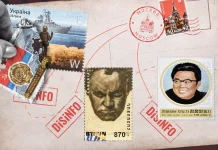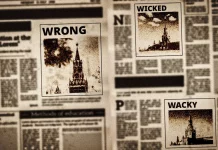
By Michael Colborne, for Coda
Pro-Kremlin media have found fertile ground for Islamophobia in a country where most people have no personal experience with Islam
Nestled in a courtyard a short walk from the bustle of Wenceslas Square, Prague’s central Islamic Center isn’t exactly easy to find. Save for a rug and a few wooden shelves for shoes by the door, there’s not a lot here that could help you guess what’s inside — no sign in the window, no office hours, no name.
On a Friday afternoon, the main room down on the ground floor slowly fills almost shoulder to shoulder with maybe a hundred or more men and boys; the women and children use rooms upstairs. As the adhan, the Islamic call to prayer, sounds out, a few latecomers manage to squeeze in. For half an hour, the mosque looks like the most popular place in Prague.
But nothing could be further from the truth, says Raed Shaikh, an engineer of Palestinian origin who has lived in Prague for over two decades. “If you look at our numbers, we’re nothing,” he tells me after prayers.
Muslims are a tiny, fragmented minority in the Czech Republic. It’s estimated there are between just 10,000 and 20,000 in this country of more than 10 million — no more than 0.2 percent of the population. The first mosque wasn’t even built here until 1998.
And yet, recently, Muslims in the Czech Republic have been forced into the media spotlight, getting an unprecedented amount of attention as the subject of viral, fake stories, ranging from tales of two Syrian migrant men allegedly escaping custody after raping two girls to accounts of Islamic State fighters supposedly training at a shooting range in the Czech countryside. Just this month, headlines from the popular Breitbart-style Parlamentní listy (Parliamentary Journal or PL) website told Czechs that Germans are fleeing from Arabs and Africans in their own country and that “Muslim immigrants” regularly rape women and children in Sweden. The site lamented “Islam’s conquest of Europe” with the subhed, “What we’ve lost and what we can still salvage.”
Last year, another website, Svět kolem nás (The World Around Us), called on Czechs to arm themselves with guns and to “fight back.”
“You and your children will be the first victims of immigrant violence and terror,” an anonymous author wrote, “and the police won’t protect you.”
What all these websites share, apart from anti-Muslim sentiment, is an obvious pro-Kremlin bias. Sites like PL and Svět kolem nás, along with a few dozen others, regularly push Moscow’s line on everything from Ukraine to Syria and Donald Trump.
Anti-Muslim sentiments have always lingered on the fringe of Czech political debate, but the language of these sites started to become particularly aggressive as the European migration crisis began in early 2015 and the sites shifted away from Ukraine as their main focus.
The language became so aggressive that the Czech Ministry of the Interior noted in a October 2015 quarterly report on extremism that several of these websites, including the Czech-language version of the Kremlin-funded Sputnik, used “exaggerated statistics” on the migration crisis and alleged terror threats, “the apparent aim [of which was] to spread and cause fear and panic.”
Aside from Sputnik, it isn’t easy to pin down who exactly runs and funds these websites, let alone find the Kremlin’s fingerprints on them. Jakub Janda, the head of the Kremlin Watch program at Prague’s European Values Think-Tank, a pro-Western non-governmental organization, is one of several Czech journalists and researchers who have spent years trying to find evidence of Kremlin involvement beyond the outlets’ obvious pro-Kremlin editorial position. But the search has yielded little hard evidence
“These outlets are 100 percent non-transparent,” says Janda. “It’s hard to actually see where they get funding.” Janda says he worries that while, for now, only a few of them have “minor financial ties to Russia,” they carry Moscow’s message and he believes that the Kremlin has positioned itself to “pour money into them,” if necessary. For now, there seems to be no need, as the websites make enough profit from advertising, Janda claims.
The Kremlin’s promotion of anti-Muslim messages, Janda claims, is part of a longer-term goal of destabilizing the Czech Republic and getting the country out of the European Union. “The pro-Kremlin narrative is that if we quit the EU, we will avoid Muslim migration,” he says, adding that this isn’t the case.

The readership numbers for outlets sharing Moscow’s line on Muslim migration are relatively low, however. Netmonitor.cz, a research project on the Czech Internet, reports that Parlamentní listy, the largest of the anti-Muslim outlets, averaged 123,000 readers per day in January, compared with 1.6 million for the most popular Czech news website, novinky.cz. Nonetheless, the fringe sites’ aggressive anti-Muslim messages have spilled over into the mainstream.
“If you just watch the TV news, most of the news you see about Muslims is negative,” says Lukas Houdek, project coordinator of HateFree, a government-run, Czech anti-discrimination organization that has documented and debunked approximately 100 anti-Muslim hoax stories in the Czech Republic over the past few years.
Houdek, like most observers here, believes that Islamophobia has found a fertile ground in a country where many people have no personal experience with Islam. Anti-Muslim attitudes appear born more out of fear of the unknown than anything else.
The 2014 version of the European Social Survey, a biennial cross-national sociological survey, found that its more than 2,000 respondents were less likely than people in the 20 other countries surveyed to be in favor of letting Muslims come and live among them. More recently, a Eurobarometer survey of 1,000 Czechs in May 2016 found they were the least likely to think their country should help refugees; only 21 percent of Czechs agreed, compared to 63 percent across the European Union as a whole.
Given those views, it is no surprise that anti-Muslim images can resonate widely here and are picked up by the mainstream media. HlídacíPes.org (“The Watchdog”), an independent Czech journalism project, reported that journalists at one of the country’s largest TV news stations, Prima TV, were instructed by their editors to present the European migration crisis in a negative way. The Czech broadcasting regulator subsequently chastised the station, which has denounced the accusations as groundless.
“Czech media coverage doesn’t distinguish between fact and opinion on Islam,” says Bronislav Ostřanský, a scholar on Islam with the Czech Academy of Sciences. Islamophobia, he argues, is “absolutely mainstream.” “It is not a question of just some extremists, some populists or nationalists. It is absolutely mainstream.”
According to Zora Hesova, a research fellow at the Association for International Affairs, a foreign-policy think-tank in Prague, no one played a greater role in bringing Islamophobia from the fringes into the mainstream of Czech media and political discourse than the country’s most prominent pro-Kremlin politician, President Miloš Zeman.
The 72-year-old Zeman, who’s described himself as a “tolerant atheist,” seems comfortable in his role as the country’s Islamophobe-in-Chief. Zeman calls Islam a “religion of death” and once said Muslims were “practically impossible” to integrate into Czech society. Echoing fringe websites like Svět kolem nás, Zeman called on Czech citizens to arm themselves against a possible “super-Holocaust” by Muslim terrorists. “We will be robbed of the beauty of our women because they will be covered head to toe in a burka,” he said in 2015.
But Zeman’s anti-Muslim messages have helped persuade many, including his detractors.
“Zeman has such a high profile,” says Ostřanský. “He is beloved and he is hated. But when he starts to hate Muslims, even people that don’t like him, they clap their hands.”
The numbers bear this out — in mid-2016, Zeman’s fierce anti-Muslim messages helped pushed his approval ratings to new highs. The president’s rhetoric might actually help him offset his well-documented, pro-Kremlin leanings, given that most Czechs do not altogether share his enthusiasm for Russia.
A recent survey of more than 1,000 people found that only eight percent of Czechs felt “very sympathetic” towards Russia, compared to 17 percent who said the same about the United States. Another, similarly sized survey late last year found that former U.S. President Barack Obama was the most trusted among international politicians, while Vladimir Putin was the second most mistrusted behind — in a potential reflection of the strength of anti-Muslim and anti-migrant sentiment — German Chancellor Angela Merkel.
In October 2015, Zeman invited an anti-Islam group called “We don’t want Islam in the Czech Republic” (Islám v České republice nechceme – IVCRN) to organize a conference in the Czech senate. Zeman invited IVCRN’s leader, Martin Konvička, and his supporters up on stage as part of an anniversary of the 1989 Velvet Revolution. Since then, IVCRN has seen its profile become more prominent, and has gone on to garner international press attention for staging a panic-inducing fake Islamic State attack “protest” in the heart of Prague. “It became acceptable to present far-fetched anti-Muslim opinions and borderline racist attitudes,” the Association for International Affairs’ Hesova writes.
“He hates Muslims,” Shaikh, an engineer of Palestinian origin whom I met at Prague’s main mosque, says of the Czech president. After nearly two decades in the Czech capital, Shaikh claims that the press coverage of Muslims has worsened over the past two years, thanks to terror attacks in Europe and the migrant crisis. Like many Czech Muslims, he knows that his community needs to try and counter the media’s artificial, negative images of them, but that’s easier said than done.
“With our resources, it’s very difficult,” Shaikh laments. Community activists do not have sufficient public relations or media expertise to go on television shows and give effective interviews, he believes.
Without those skills, he says, Muslim community leaders are hesitant to get too involved with the media, worried their words will be misinterpreted and twisted; especially since they’ve already seen one former community leader charged (and acquitted) of promoting hate speech.
“Every single word we say is counted against us,” Shaikh says. “We have no influence. But we have to survive.”
Part of the issue facing the Muslim community is that the community itself is fragmented and relatively diverse, says Dr. Ostřanský at the Czech Academy of Sciences. That makes it difficult for them to build a coherent, unified message.
Mohammed Abdelmajid, a physician of Palestinian origin who has lived in Prague for more than two decades, agrees that countering the influence of well-resourced outlets and websites is difficult.
“It’s easy to spread a lie,” he says, “but it’s very difficult to counter that lie.”
By Michael Colborne, for Coda





